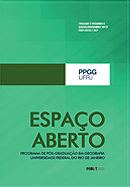Colonialismo Carbônico na Amazônia?
DOI:
https://doi.org/10.36403/espacoaberto.2013.2118Palavras-chave:
Amazônia, Modo de Vida na Fronteira Agrícola, Mobilidade Espacial, Desflorestamento, Colonialismo CarbônicoResumo
Processos inter-regionais de significância global envolvendo desflorestamento
causado por camponeses de frentes de expansão da Amazônia são apresentados pelos olhos destes, que durante a vida passaram de frentes de expansão do Oeste do Maranhão para os garimpos do Oeste do Pará e retornaram às frentes de expansão na região de Itaituba. Desmascarando a retórica ambientalista, que culpa a agricultura de queimada das zonas tropicais do mundo por problemas globais com emissões carbônicas, a percepção local do modo de vida rural revela como os camponeses escaparam da pobreza aguda do seu lugar de origem, mas acabaram nas condições degradantes do garimpo de ouro e, finalmente, chegaram à situação atual como agricultores pobres, porém independentes nas frentes de expansão do Oeste do Pará. Contudo, essa melhoria relativa de vida é sustentada por sistemas agrícolas que provocam desflorestamento e esgotamento das terras em longo prazo, e, assim, acaba recriando os problemas socioambientais do Nordeste no Norte. Por causa disso, as propostas visando a reduzir a degradação ambiental e a pobreza na Amazônia também devem incluir medidas para solucionar o subdesenvolvimento do Nordeste, que leva tantos camponeses a sair de sua região de origem.


